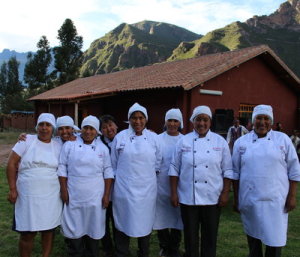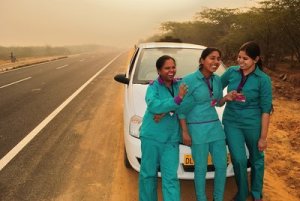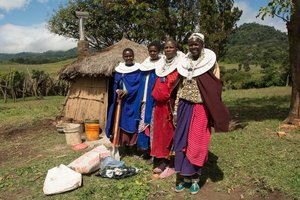Tourism, one of the largest industries on earth, can prove vital to the livelihood of countless women in developing countries worldwide. It can create employment opportunities, foster financial security, and break down the barriers of inequality and poverty. In honor of International Women’s Day, SEE Change sat down with Kelly Galaski, Program Manager at Planeterra, the nonprofit foundation and social enterprising arm of Canadian tour operator G Adventures.
The global ambassador and expert of sustainable tourism shares her thoughts on how travel can positively impact women, what Planterra is doing to effect change on the ground – including a new Women on Wheels project in New Delhi – and how travelers can help close the gender gap and improve quality of life for women.
Speaking generally, how can tourism play a role in empowering women and, more importantly, why should it?
Women are often the first to be excluded from formal education institutes in many places across the globe. It’s an unfortunate reality that girls are the first to be pulled from school to help out families around the home. The tourism industry is able to utilize and build up many transferrable skills that are learned outside of the classroom, and through vocational training programs can provide sustainable, long-term, dignified job opportunities for women in a booming industry.
What inspired Planeterra/G Adventures to make that mission an important one?
Planeterra is G Adventures’ non-profit Foundation. As a social enterprise, we have seen the opportunity that tourism can bring to some of the most rural and under-served people worldwide. The hospitality and tourism industry is one of few industries that are able to spread wealth so widely across the globe, and can harness several transferrable skills that many women worldwide have – creating a more inclusive economy.
Planeterra focuses on livelihood development through five broad hospitality streams: 1) vocational training restaurants, 2) community-run accommodation, 3) cooperatives and handicrafts, 4) transport, and 5) community-run experiences and tours. Many of these are entry points for women to work and earn an income, provide for their families, and be in a supportive environment of other women and community members.
What was the impetus behind the recently launched Women on Wheels project in New Delhi?
With the rise in concern for both domestic and international women in India, G Adventures and Planeterra have started to work with Women on Wheels to provide safe transport and a safe customer base for women in India. G Adventures’ customer base in India is composed of mostly single travelling females, arriving on overnight international flights. It was the perfect match to provide our customers with a value added experience and provide Women on Wheels with a guaranteed safe customer base so they can expand their programs.
Explain how the program works and its mission
Our local partners provide an 18-month training program for poor urban women in Delhi — teaching the beneficiaries how to drive in a car simulator, on road driving, English, hospitality, communications, booking reservations, CPR, First Aid, self-defense, and then work with the women to obtain their professional chauffeurs license. The training has allowed these women to access job opportunities and often become the primary breadwinner in their family. The organization had great success with a domestic female client base but the partnership with G Adventures and Planeterra has expanded their reach to include international women. Women on Wheel drivers chauffeur other single travelling females, or females travelling with a partner or family.
G Adventures has also provided training and an additional three fleet vehicles, quadrupling the number of cars available for the beneficiaries. As G Adventures has travellers in over 100 countries, we are looking to work with our partners to help them expand in regions beyond India.
What do you hope the program will achieve long-term and how can tourists help?
It’s a good idea to do research before you leave home and ask questions when you arrive in destination. Ask your tour operator how they’re supporting women in the destinations they operate in. Once you start looking, you’ll be surprised to see what you may find – cooperatives, social enterprises, small businesses, etc., that focus on providing women with opportunities.
Supporting women-run social enterprises, especially ones that are providing access to training for adult women is always a great way to support women abroad. When you support an adult woman and her business, you are also supporting a means for her to help provide for her children and family.
Tell me about some other Planeterra initiatives that empower women around the world and their impact
We have several projects that empower women around the world to earn a livelihood, learn new skills, and in many cases change the dynamic in often male-dominant cultures. Women who were previously very dependent on their spouses now contribute to the family’s well-being and have earned respect not only in their families, but within their communities as well.
For example, we started a weaving cooperative with a group of women in 2005 in an indigenous Andean village outside of Cusco, Peru. The women saw the benefit their husbands were receiving by being employed in tourism as porters (by G Adventures) and were looking for a way to benefit also. Since then the group has grown to over 55 members. Tourists visit the women daily to learn about the weaving process and purchase handmade textiles and other knit crafts. These women are now able to send their children to school and to university in Cusco — many of them illiterate themselves. They are proud of their accomplishments and the power they have to make differences in their own lives.
In Guatemala we work with another indigenous and traditional Mayan community. The women participate in a home stay program and recently joined the official tourism economy for the first time. They never received a formal education or training but it was a way for them to earn supplementary income for their family, in addition to providing for their children. The women tend to take control of the small business in terms of planning activities, managing the finances, purchasing goods needed, maintaining the rooms, etc., and report higher levels of confidence and self esteem.
In another village in Peru, we built a restaurant that is owned and managed by the community association, which tends to be led by men. It was the women though (almost 30 in total) who came out for the training to learn how to cook and serve. They now make up the majority of the employees both in the kitchen and dining room. For some of them it was the first time ever using a refrigerator and gas stove. Now they run a professional kitchen and serve up to 100 guests per day. The women shed tears when they talk of how proud they are of themselves and their fellow neighbours who learned in a short time how to provide such a great experience to so many travellers from all over the world. They are able to earn an income close to home since they live nearby, and they are very grateful for secure work that allows them to keep an eye on their children. The women have an average of four to six children each.
Nepal is an epicentre for human trafficking with as many as 7,000 women and girls trafficked out of Nepal into India each year, and around 200,000 currently in forced working conditions in Indian brothels. It is often the victims of trafficking that are wrongfully arrested, fined, and then bailed out by their traffickers, only further exploiting women and girls further into forced labour and abuse. Planeterra is working with a grassroots organization that trains survivors of human-trafficking to become certified paralegals. Our partners find job placements for these new graduates in local police stations where they become the first point of contact for a girl that enters the police station for the first time.
This project ensures that women’s rights are protected, cases are filed, and that the exploiters are rightfully prosecuted — not the victim, thus breaking the cycle of corruption. As the winner of The G Project initiative held by G Adventures, this project was granted $25,000 to provide job training in the hospitality industry with a full-time English tutor for women survivors of trafficking. These funds launched a new program where the survivors provide dumpling-making classes for G Adventures’ travellers on a daily basis and educate them on the issues women face in Nepal. The project, which is now a tour available for anyone travelling in Kathmandu, is completely run by survivors.
In Tanzania, 95 per cent of the population relies on solid fuels (wood and coal) for cooking. Over 77 per cent of the population uses wood for cooking, which needs to be collected — a cumbersome practice that often falls to the women and girls in the household and leads to household air pollution through traditional cooking practices (cooking over an open-fire stove or inefficient fuel burning stove) which is the fourth biggest health risk in the world. G Adventures and Planeterra are working with a local partner to install clean cookstoves in over sixty Maasai villages across the Serengeti, removing 90 per cent of indoor smoke from bomas that house an average of seven people.
The community is involved from the start with all materials manufactured in the area. This stimulates the local economy and empowers people — especially women. We work closely with Maasai women to incorporate their ideas in the design of the stoves. Through a 10-day program, women are trained as fundis (experts) to distribute and install the stoves in their villages and neighbouring villages. They work in groups of five to 10, selected by village women during a community meeting. So far, the Maasai Clean Cookstoves project has trained 75 women as fundis and installed 750 stoves in this region. On select G Adventures Tanzania itineraries, travellers visit these villages, meet the Maasai engineers, and learn the daily work performed to install the stoves. Each group visit to these communities provides a stove for a household that currently does not have one.
We work to invest and incubate many women-run businesses worldwide, to learn more, visit: www.planeterra.org



